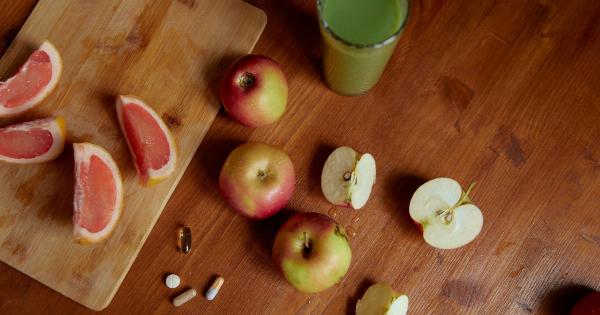When it comes to taking medications, many people tend to overlook the potential interactions that certain foods, including vegetables, can have on their effectiveness and safety.
While vegetables are generally considered a healthy addition to any diet, it is important to understand how some vegetables can interfere or enhance the effects of certain medications. In this guide, we will delve into the various vegetable interactions with medications and provide insights to help you make informed decisions about your health.
1. Leafy Greens and Blood Thinners
Leafy green vegetables such as kale, spinach, and collard greens are packed with essential nutrients and are generally recommended for a balanced diet. However, if you are taking blood thinners like warfarin, you need to be cautious.
These vegetables are rich in vitamin K, which plays a crucial role in blood clotting. Consuming high amounts of vitamin K can reduce the effectiveness of blood thinners, potentially leading to an increased risk of blood clots.
If you are on blood thinners, it’s important to maintain a consistent intake of vitamin K from leafy greens and consult your healthcare provider for appropriate dosage adjustments.
2. Grapefruit and Prescription Medications
Although not a vegetable, grapefruit deserves a mention due to its potential interaction with certain medications.
Grapefruit contains compounds that can interfere with the activity of specific enzymes in the liver, affecting the way medications are metabolized. This interference can result in either increased or decreased levels of the medication in your body, leading to unpredictable effects.
It is highly advisable to check with your healthcare provider if you are prescribed medications that may interact with grapefruit.
3. Garlic and Anticoagulants
Garlic, known for its immune-boosting properties, is a culinary staple in many cuisines. While it offers numerous health benefits, it has also shown some interactions with anticoagulants, such as aspirin or warfarin.
Garlic has natural blood-thinning properties and can increase the risk of bleeding when combined with these medications. If you are on anticoagulants, moderate or avoid excessive garlic consumption, especially in supplement form, and inform your healthcare provider about your garlic intake.
4. Cruciferous Vegetables and Thyroid Medications
Cruciferous vegetables, including broccoli, cabbage, and cauliflower, are known for their cancer-fighting compounds and high nutritional value.
However, these vegetables contain substances called goitrogens, which can interfere with thyroid hormone production. If you are taking medication for thyroid conditions, it is advisable to moderate your intake of cruciferous vegetables and ensure they are properly cooked.
Cooking reduces the goitrogenic properties, making them safer to consume without interfering with your medication.
5. St. John’s Wort and Antidepressants
St. John’s Wort, an herbal supplement widely used for depression, can interact with various antidepressant medications.
This herb contains compounds that can affect the levels of certain neurotransmitters in the brain, potentially reducing the effectiveness of prescription antidepressants. Combining St. John’s Wort with certain antidepressant medications can lead to a condition known as serotonin syndrome, which can cause agitation, confusion, and rapid heartbeat.
It is crucial to inform your healthcare provider if you are considering or already taking St. John’s Wort as a supplement.
6. Beetroot and Blood Pressure Medications
Beetroot, with its vibrant color and nutrient profile, is considered a superfood for its potential blood pressure-lowering effects. While this may be beneficial for some, individuals taking blood pressure medications should exercise caution.
Beetroot contains high levels of nitrates, which can enhance the blood pressure-lowering effects of these medications, potentially causing an excessive drop in blood pressure. If you are on blood pressure medication, discuss with your healthcare provider before adding significant amounts of beetroot or beetroot supplements to your diet.
7. Ginger and Blood Thinners
Ginger, commonly used as a natural remedy for nausea and inflammation, can interact with blood-thinning medications similar to leafy greens.
It also has blood-thinning properties that could increase the risk of bleeding when combined with medications like warfarin. If you use ginger as a supplement or consume it regularly, it’s vital to inform your healthcare provider, who can advise you on the appropriate dosage and timing to avoid potential interactions.
8. Celery and Diuretics
Celery, a crunchy and refreshing vegetable, is often perceived as a natural diuretic due to its high water content and certain compounds.
If you are already taking diuretic medications for conditions like high blood pressure or edema, adding significant amounts of celery to your diet may enhance the diuretic effect and potentially lead to excessive fluid loss. It is advisable to discuss the consumption of celery and its potential effects with your healthcare provider to ensure the proper balance.
9. Spinach and Calcium Channel Blockers
Spinach, a nutritious leafy green packed with vitamins and minerals, can interfere with medications known as calcium channel blockers, commonly prescribed for high blood pressure and heart conditions.
Spinach contains high levels of potassium and can counteract the effects of these medications, leading to a potential increase in blood pressure. It’s important to monitor your potassium intake, including spinach, and consult your healthcare provider for dietary guidance and potential adjustments to your medication dosage.
10. Tomato and ACE Inhibitors
Tomatoes, a popular vegetable known for their lycopene content and diverse culinary uses, can interact with medications called ACE inhibitors, often prescribed for high blood pressure and heart failure.
Tomatoes are rich in potassium, and excessive consumption can counteract the effects of ACE inhibitors, potentially resulting in increased blood pressure. It is recommended to moderate your intake of tomatoes and discuss with your healthcare provider to ensure a proper balance between dietary potassium and medication effectiveness.
Conclusion
Vegetables are undoubtedly an essential part of a healthy diet. However, it is crucial to be aware of potential interactions between certain vegetables and medications.
This guide has shed light on various interactions, including leafy greens with blood thinners, grapefruit with prescription medications, garlic with anticoagulants, cruciferous vegetables with thyroid medications, St. John’s Wort with antidepressants, beetroot with blood pressure medications, ginger with blood thinners, celery with diuretics, spinach with calcium channel blockers, and tomatoes with ACE inhibitors.
By understanding these interactions, consulting with your healthcare provider, and making informed choices about your diet, you can better ensure the effectiveness and safety of your medications.






























